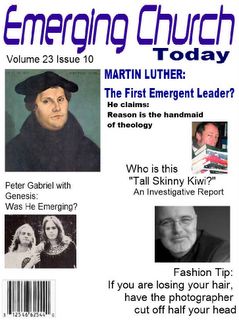 One of the hallmarks of postmodernity is its suspicion of Reason as the final arbiter of the “Truth.” Christians in the Emerging Movement (which is heavily engaged in the postmodern turn) are sympathetic to this skepticism of Reason. As we see it, if Rationality (or “Reasoned Arguments”) is placed as the ultimate authority in our finding truth, then we had better look at who is on the throne: it is no longer God, it is Reason. Rationality needs to find its place somewhere below, and God and the story of his interaction with humanity needs to be placed above.
One of the hallmarks of postmodernity is its suspicion of Reason as the final arbiter of the “Truth.” Christians in the Emerging Movement (which is heavily engaged in the postmodern turn) are sympathetic to this skepticism of Reason. As we see it, if Rationality (or “Reasoned Arguments”) is placed as the ultimate authority in our finding truth, then we had better look at who is on the throne: it is no longer God, it is Reason. Rationality needs to find its place somewhere below, and God and the story of his interaction with humanity needs to be placed above.This is not a new way of thinking. It was Martin Luther who first distinguished between the magisterial and ministerial roles for Reason. What postmodern Christians (those in the emerging church conversation) are reacting against is the increasing magisterial role that Reason has gained over the last century. Much of Western Christianity has allowed a syncretism to occur in which Reason has blended with faith. We are reacting against a Christianity that seeks to legitimize the faith by way of Reason, which places the faith under Reason as its magistrate. In many modern churches, Reason stands over and above the gospel, acting as judge so as to legitimate the gospel. This is what Martin Luther was warning against.
The ministerial role of Reason, however, makes it the “handmaid of theology.” Reason is merely one of the tools we have at our disposal to understand our faith. Postmodernity is a reaction against the ideology that Reason and Science would give rise to a moral society. They are skeptical of Reason because, in the Modern age, it has been shown to be such a bad magistrate of what is true. When Reason is placed in the magisterial position as the final arbiter of truth, the results have been disastrous. Look at the holocausts of the 40's and 50's. Germany was the pinnacle of reasoned ideology, the ultimate enlightenment civilization. The gas chambers were a scientifically sound and reasoned way to bring the solution to those “genetically deficient Jews.” America was the world leader in scientific progress. Scientific objectivity and reasoned argument brought about the bombing of Hiroshima and Nagasaki. These events showed the moral deficiency of objective rational thought and gave rise to postmodernity. These events made philosophers begin to question the entire enlightenment ideology of "objective” reason.
I, as an “emerging Christian,” affirm this. I am simply seeking to place Reason back in its ministerial role. Call me a postmodern Martin Luther.
technorati: emerging church, postmodernity

8 comments:
You know, I'll be honest - I've read very little of the Reformers, mostly because so much of what I read from those who claim to follow in their tradition makes me so angry. But when I read what they actually wrote, I often find myself saying, "Yes!" I think I need to cut out the middle man, so to speak, and pick up some of their writings to see for myself.
This could get you in trouble in some circles, you know... ;)
Scott,
I'm certainly not a Lutheran. But isn't Luther right at least on this point? I think the EC can affirm Luther's stand on Reason at least to some degree.
As for "some circles," I've been in trouble before!!! :D
Great post, Bob.
I've often thought that Kierkegaard ought to be "the patron saint of all things emergent," given his strong Christian critique of hubris of human reason that characterized modernity. But, as your post makes clear, in this critique he was just being a good Lutheran. I'm not sure that either Luther or Kierkegaard would want to be patron saint of much of anything, but we certainly have a lot to learn from both of them.
The kinds of circles this stuff could get you in trouble with are the kinds of circles you want to be in trouble with!
Thanks.
as a Lutheran I'll be reading this tomorrow after Sunday worship!
:-) Thanks
I have many friends who are Lutherans (and who I deeply respect) and I thought they'd get a kick out of this post as well!
Hi Sivin! Good to hear from you again.
There's a lot of stuff that could be said about Luther and how we interpreted and reinterpreted by the Pietist revival/renewal movement with Spener, Francke and Zinzendorf.
So when you gonna interact more with the Christian Pragmatic Progressive Party Platform, Bob?
Sure it's utopic, but it's meant to help foster changes in existing parties and people's ways of thinking about politics. But it can't do that if we don't talk about it.
dlw
Please pardon my ignorance, but if we don't use reason to make sense of things, what do we use? And what exactly do you mean by "reason" anyway?
Do you have an elevator explanation - you know, a summary you might tell to someone riding up 10 floors with you?
Incidentally, I enjoy reading you and have added a linked to you from my site.
Reason is the right application of the rules of grammar in a given language. It is a critical part of the communication process for the coordination of our actions.
It's application does not by any means guarantee the validity of the assumptions by which we frame the extant issues being considered.
dlw
Post a Comment